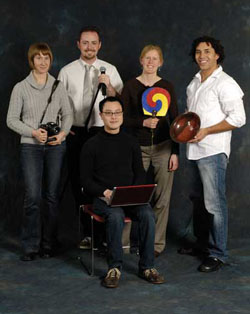Written by Robby MaBain

Hopkins nursing students pursue a surprisingly rich variety of career paths before attending nursing school. Rather than viewing the transition to nursing as a step away from past careers, many students see it as a natural progression.
After volunteering as a non-violent interventionist in the West Bank, Rachel Katonak ’08 has learned to approach problems from multiple perspectives. Working alongside Palestinians and Israelis, she found that politics on the ground were far more complicated than they appeared in American news. Now, working in a hospital setting, she is wary of jumping to conclusions about her patients. “I understand what it’s like to have preconceived notions,” she says.
Anthony Pho, accelerated class of 2008, is prepared to bring the flexibility he learned in his job as a Microsoft program manager into the field of nursing.
“Software is a complex system–like a person,” he says. ” Of course, with a person, the stakes are much higher. As a program manager, you have to like people and you have to understand each specialist’s underlying role. The same thing applies to nursing.”
For Kyle Blount ’08, the key link between his experience as a potter and his new career in nursing is patience. As the manager of a camp art department in New Mexico, Kyle worked to transform “imperfect mounds of various elements” into works of art. “In both pottery and nursing, the essence of your medium does not change, it is only reformed, refined and given new life through your intervention. As both a nurse and a potter, I am a catalyst for change, promoting a reaction and patiently waiting for the outcome.”
As a performer and director in an improv and sketch comedy group, Brian Miner ’08 was more concerned with spontaneity than he was with patience. Upon discovering that one of the theaters in his home town was short on rent, Brian gathered a few friends and put together a show that was initially slotted to run for four weeks. It turned out to be such a hit that it ran for 18 months! How does comedy relate to nursing? According to Brian, “working as a comic has taught me to think on my feet and to keep a positive attitude through laughter in difficult situations.”
Olivia Robbie, accelerated class of 2008, valued her ability to put her students at ease when teaching English as a Second Language. “Students were often very nervous about making mistakes. It was important to gain their trust so that they could relax and think clearly.” As a foreign teacher in Seoul, South Korea, Olivia found out how difficult it can be to feel at ease in an alien environment. “When you’re in an unfamiliar place–whether it’s a foreign country or a hospital–even the smallest things can seem frightening. A nurse who understands this can help a patient to relax.”